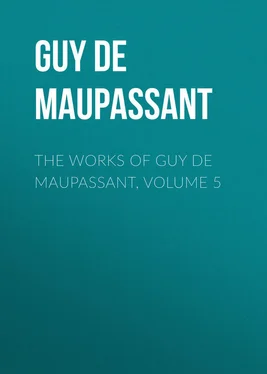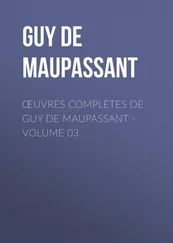Guy Maupassant - The works of Guy de Maupassant, Volume 5
Здесь есть возможность читать онлайн «Guy Maupassant - The works of Guy de Maupassant, Volume 5» — ознакомительный отрывок электронной книги совершенно бесплатно, а после прочтения отрывка купить полную версию. В некоторых случаях можно слушать аудио, скачать через торрент в формате fb2 и присутствует краткое содержание. Жанр: literature_19, foreign_antique, foreign_prose, на английском языке. Описание произведения, (предисловие) а так же отзывы посетителей доступны на портале библиотеки ЛибКат.
- Название:The works of Guy de Maupassant, Volume 5
- Автор:
- Жанр:
- Год:неизвестен
- ISBN:нет данных
- Рейтинг книги:3 / 5. Голосов: 1
-
Избранное:Добавить в избранное
- Отзывы:
-
Ваша оценка:
- 60
- 1
- 2
- 3
- 4
- 5
The works of Guy de Maupassant, Volume 5: краткое содержание, описание и аннотация
Предлагаем к чтению аннотацию, описание, краткое содержание или предисловие (зависит от того, что написал сам автор книги «The works of Guy de Maupassant, Volume 5»). Если вы не нашли необходимую информацию о книге — напишите в комментариях, мы постараемся отыскать её.
The works of Guy de Maupassant, Volume 5 — читать онлайн ознакомительный отрывок
Ниже представлен текст книги, разбитый по страницам. Система сохранения места последней прочитанной страницы, позволяет с удобством читать онлайн бесплатно книгу «The works of Guy de Maupassant, Volume 5», без необходимости каждый раз заново искать на чём Вы остановились. Поставьте закладку, и сможете в любой момент перейти на страницу, на которой закончили чтение.
Интервал:
Закладка:
The day after they reached Paris, she said to Julien:
"Will you give me mamma's money, dear? I want to buy some things."
He looked rather cross.
"How much do you want?" he asked.
"Oh – what you like," she answered in surprise.
"I will give you a hundred francs," he answered; "and whatever you do, don't waste it."
She did not know what to say, she felt so amazed and confused, but at last she said in a hesitating way:
"But – I gave you that money to – "
He interrupted her.
"Yes, exactly. What does it matter whether it's in your pocket or mine now that we share everything? I am not refusing you the money, am I? I am going to give you a hundred francs."
She took the five pieces of gold without another word; she did not dare ask for more, so she bought nothing but the pistol.
A week later they started for Les Peuples.
VI
When the post-chaise drove up, the baron and baroness and all the servants were standing outside the white railings to give the travelers a hearty welcome home. The baroness cried, Jeanne quietly wiped away two tears, and her father walked backwards and forwards nervously. Then, while the luggage was being brought in, the whole journey was gone over again before the drawing-room fire. The eager words flowed from Jeanne's lips, and in half-an-hour she had related everything, except a few little details she forgot in her haste. Then she went to unpack, with Rosalie, who was in a state of great excitement, to help her; when she had finished and everything had been put away in its proper place Rosalie left her mistress, and Jeanne sat down, feeling a little tired. She wondered what she could do next, and she tried to think of some occupation for her mind, some task for her fingers. She did not want to go down to the drawing-room again to sit by her mother who was dozing, and she thought of going for a walk, but it was so miserable out of doors that only to glance out of the window made her feel melancholy.
Then the thought flashed across her mind that now there never would be anything for her to do. At the convent the future had always given her something to think about, and her dreams had filled the hours, so that their flight had passed unnoticed; but she had hardly left the convent when her love-dreams had been realized. In a few weeks she had met, loved, and married a man who had borne her away in his arms without giving her time to think of anything. But now the sweet reality of the first few weeks of married life was going to become a daily monotony, barring the way to all the hopes and delicious fears of an unknown future. There was nothing more to which she could look forward, nothing more for her to do, to-day, to-morrow, or ever. She felt all that with a vague sensation of disillusion and melancholy. She rose and went to lean her forehead against the cold window-pane, and, after looking for some time at the dull sky and heavy clouds, she made up her mind to go out.
Could it really be the same country, the same grass, the same trees as she had seen with such joy in May? What had become of the sun-bathed leaves, and the flaming dandelions, the blood-red poppies, the pure marguerites that had reared their heads amidst the green grass above which had fluttered innumerable yellow butterflies? They were all gone, and the very air seemed changed, for now it was no longer full of life, and fertilizing germs and intoxicating perfumes. The avenues were soaked by the autumn rains and covered with a thick carpet of dead leaves, and the thin branches of the poplars trembled in the wind which was shaking off the few leaves that still hung on them. All day long these last, golden leaves hovered and whirled in the air for a few seconds and then fell, in an incessant, melancholy rain.
Jeanne walked on down to the wood. It gave her the sad impression of being in the room of a dying man. The leafy walls which had separated the pretty winding paths no longer existed, the branches of the shrubs blew mournfully one against the other, the rustling of the fallen leaves, that the wind was blowing about and piling into heaps, sounded like a dying sigh, and the birds hopped from tree to tree with shivering little chirps, vainly seeking a shelter from the cold. Shielded by the elms which formed a sort of vanguard against the sea-wind, the linden and the plane-tree were still covered with leaves, and the one was clothed in a mantle of scarlet velvet, the other in a cloak of orange silk. Jeanne walked slowly along the baroness's avenue, by the side of Couillard's farm, beginning to realize what a dull, monotonous life lay before her; then she sat down on the slope where Julien had first told his love, too sad even to think and only feeling that she would like to go to bed and sleep, so that she might escape from this melancholy day. Looking up she saw a seagull blown along by a gust of wind, and she suddenly thought of the eagle she had seen in Corsica in the somber valley of Ota. As she sat there she could see again the island with its sun-ripened oranges, its strong perfumes, its pink-topped mountains, its azure bays, its ravines, with their rushing torrents, and it gave her a sharp pain to think of that happy time that was past and gone; and the damp, rugged country by which she was now surrounded, the mournful fall of the leaves, the gray clouds hurrying before the wind, made her feel so miserable that she went indoors, feeling that she should cry if she stayed out any longer. She found her mother, who was accustomed to these dull days, dozing over the fire. The baron and Julien had gone for a walk, and the night was drawing on filling the vast drawing-room with dark shadows which were sometimes dispersed by the fitful gleams of the fire; out of doors the gray sky and muddy fields could just be seen in the fading light.
The baron and Julien came in soon after Jeanne. As soon as he came into the gloomy room the baron rang the bell, exclaiming:
"How miserable you look in here! Let us have some lights."
He sat down before the fire, putting his feet near the flame, which made the mud drop off his steaming boots.
"I think it is going to freeze," he said, rubbing his hands together cheerfully. "The sky is clearing towards the north, and it's a full moon this evening. We shall have a hard frost to-night."
Then, turning towards his daughter:
"Well, my dear," he asked, "are you glad to get back to your own house and see the old people at home again?"
This simple question quite upset Jeanne. Her eyes filled with tears, and she threw herself into her father's arms, covering his face with kisses as though she would ask him to forgive her discontent. She had thought she should be so pleased to see her parents again, and now, instead of joy, she felt a coldness around her heart, and it seemed as if she could not regain all her former love for them until they had all dropped back into their ordinary ways again.
Dinner seemed very long that evening; no one spoke, and Julien did not pay the least attention to his wife. In the drawing-room after dinner, Jeanne dozed over the fire opposite the baroness who was quite asleep, and, when she was aroused for a moment by the voices of the two men, raised in argument over something, she wondered if she would ever become quite content with a pleasureless, listless life like her mother. The crackling fire burnt clear and bright, and threw sudden gleams on the faded tapestry chairs, on the fox and the stork, on the melancholy-looking heron, on the ant and the grasshopper. The baron came over to the fireplace, and held his hands to the blaze.
"The fire burns well to-night," he said; "there is a frost, I am sure."
He put his hands on Jeanne's shoulder, and, pointing to the fire:
"My child," he said, "the hearth with all one's family around it is the happiest spot on earth; there is no place like it. But don't you think we had better go to bed? You must both be quite worn out with fatigue."
Читать дальшеИнтервал:
Закладка:
Похожие книги на «The works of Guy de Maupassant, Volume 5»
Представляем Вашему вниманию похожие книги на «The works of Guy de Maupassant, Volume 5» списком для выбора. Мы отобрали схожую по названию и смыслу литературу в надежде предоставить читателям больше вариантов отыскать новые, интересные, ещё непрочитанные произведения.
Обсуждение, отзывы о книге «The works of Guy de Maupassant, Volume 5» и просто собственные мнения читателей. Оставьте ваши комментарии, напишите, что Вы думаете о произведении, его смысле или главных героях. Укажите что конкретно понравилось, а что нет, и почему Вы так считаете.












